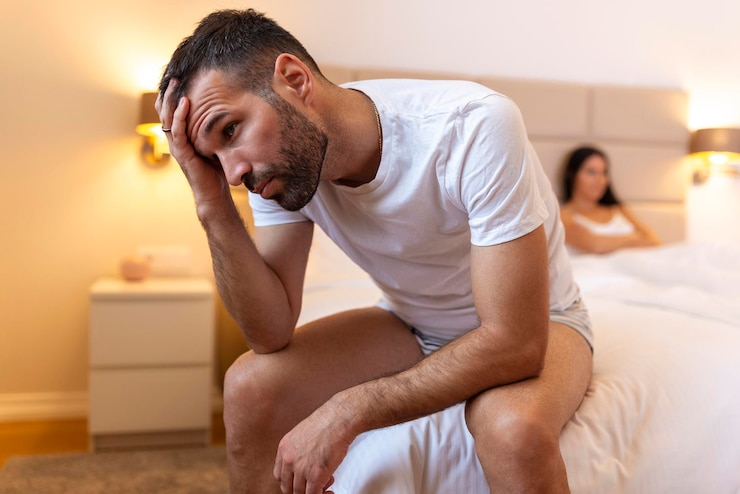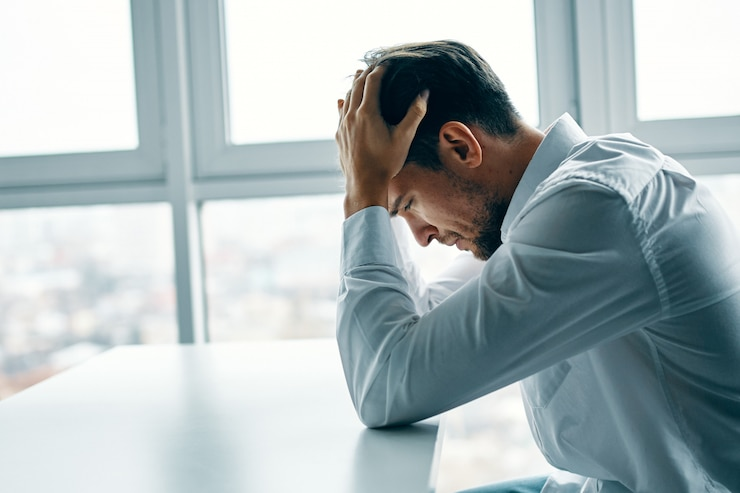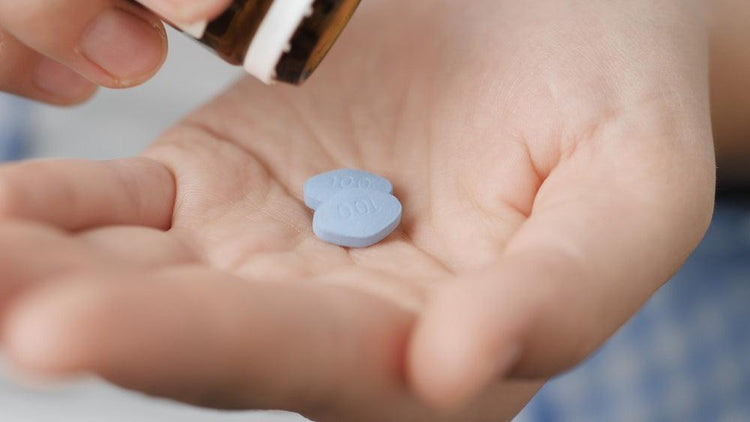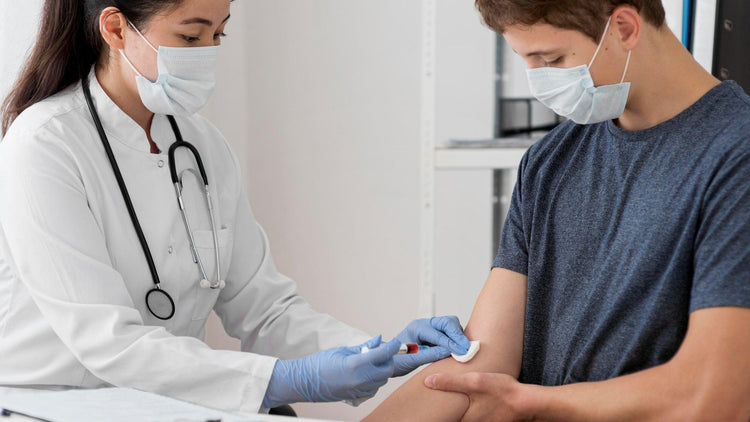What is premature ejaculation, and how to stop it?

Related products
What’s covered?
What is premature ejaculation, and how to stop it?
Everything about the causes and management of premature ejaculation.

Just like other health issues, sexual problems are widespread and can cause both physical and mental stress. For many men, premature ejaculation is a condition that may be negatively impacting sexual experiences.
What is premature ejaculation?
Normally the conclusion of sexual intercourse is defined when sexual partners have reached orgasm. For men, this includes the release of semen, also known as the ejaculation. However, some men may experience orgasm and ejaculate well before the start of intercourse or at the very beginning of intercourse. This condition is called premature ejaculation (PE).
There is no fixed definition for PE as the average duration of sex can be anywhere between 2-18 minutes. If your partner feels unsatisfied with your performance, you may have a PE at 7 minutes. It means the satisfaction of the partner defines successful intercourse, and a dissatisfied partner means premature ejaculation and sexual dysfunction.
Why does premature ejaculation happen? When should you be worried about it? How it can be controlled? We are going to answer these frequently asked questions one by one.
What are the causes of PE?
PE can be embarrassing and stressful as it can damage your self-esteem and may impact your relationships. However, it is not uncommon. A recent study conducted in the United Kingdom found that 12% of men in the age group 16-44 reported premature ejaculation in the previous year.
Additionally, failure in sex due to natural premature ejaculation is also widespread. You should worry only if you have acquired premature ejaculation, which is linked to some abnormal factors. Your PE could be due to the following causes;
Age
PE is not age dependent, as men of all ages experience it. However, ageing reduces the quality of ejaculation and erection. With the advancing age, the erectile tissues of the penis become weak. Similarly, the muscles supporting the penis also become weak.
The erections become less firm, and the threshold for ejaculation is reduced. A young man can guess the onset of ejaculation, but an older man will not know that ejaculation is coming. Hence, older men are likely to ejaculate earlier.
Inadequate communication with the partner
If you have issues with your sexual relationships or poor communication with your sexual partner, you are likely to ejaculate earlier. PE is often known to add stress to relationships, however, in some cases it may actually be caused due to problems within a relationship.
Because premature ejaculation is a sensitive subject for those who have the condition, it is often difficult to discuss with a sexual partner. Without proper communication, the problem will likely get worse.
Psychological factors
Your nervous system controls sex. Therefore, if you have any problem with your mental health and psychology, you are very likely to suffer from PE. The following psychological problems can cause premature ejaculation;
-
Lack of self-esteem and confidence
-
The painful history of past sexual abuses
-
Unrealistic expectations from your partner
-
Depression and anxiety
-
Work-related exhaustion and burnout
-
Stresses
-
Feelings of guilt
-
Financial strains, e.g., loss of employment or business losses.

These concerns need psychological and emotional counselling.
Physical causes
Some physical issues can be responsible for PE. These include;
-
Irregularities of neurotransmitters can lead to PE. Neurotransmitters are the chemical messengers in your brain that transmits messages and nerve impulses. Their disturbances can cause PE. Of particular importance is serotonin. Its higher levels are associated with more timing, while lower levels can cause PE.
-
Infections or inflammation of the urethra or prostate gland
-
Genetic disorders (inherited premature ejaculation)
-
Other reproductive diseases, e.g., erectile dysfunction, etc.
How to know if you have PE?
You can have PE due to a variety of reasons. If it is experienced only occasionally, it is not a worrying sign. However, if you are experiencing this problem repeatedly, you should go to the doctor. The doctor will establish the exact cause of PE. He will ask questions related to;
-
Frequency of problem
-
Relationship status
-
Physical examination (for physical causes)
-
Lab testing (for hormonal levels)

The identification of the cause is essential for a successful treatment. If the doctor establishes that emotional disturbances are responsible, they will ask you to visit a mental health professional. If, however, the cause identified is physical, he will refer you to a urologist or sexual health expert.
How can PE be treated?
What you should do to delay ejaculation? The treatment of PE depends on the cause. The standard treatment protocols are medications, behaviour therapy, and sex counselling. These strategies alone or in combination can work. It is your doctor's job to determine the combination that suits you best.
Behavioural modifications
Your sexual behaviour can be a cause of PE. Some techniques can help you in PE, e.g.,
-
Avoiding sexual intercourse for a while.
-
Shift the focus away from sex and indulge in other sexual plays with the partner. One idea is that you and your partner engage in role-play, for example, engage in sexual activity while acting as if you are strangers.
-
Engage in a longer duration of foreplay, as proper foreplay allows you to achieve a maximum erection.
-
Masturbating 1-2 hours before sex can also delay the onset of ejaculation because the recently sensitised nerves take time to achieve the same level of sensitisation
-
Try these tips slowly and not all at once. Too many vigorous steps at the same time, especially in the beginning can cause early ejaculation.
Physical techniques
Some physical techniques allow you to avoid early ejaculation and improve sexual performance. These include;
Pause squeeze technique
It is a simple technique and works as follows;
-
Stimulate the penis. Stop as soon as you feel the onset of ejaculation.
-
Ask your partner (or do it by yourself) to squeeze the penile neck (the junction of head and neck) until the ejaculation urge is suppressed.
-
Stimulate the penis again.
-
Repeat this as many times as much as you desire.
-
After repeating this activity many times, your penis will get enough erection to penetrate without ejaculating.
Start-stop techniques
If the pause squeeze technique doesn't suit you, you can use another alternative, i.e., the start-stop approach. In this technique, you will stop the sexual activity just before ejaculation. Then you will wait until the arousal has gone and then restart the sexual activities; you can continue the process as far as your muscles allow.
Pelvic floor exercises
No muscle is present in the shaft of the penis. However, three pelvic floor muscles on the peripheries help in erection and ejaculation. The Kegel exercises are the exercises that strengthen the pelvic floor muscles and help delay ejaculation. A simple Kegel exercise involves the following procedure;
Finding the target muscles
Before going for exercise, first, locate your pelvic floor muscles by;
-
Tightening the gas-releasing muscles around the anus.
-
Stop the urination in the middle.
These actions will cause these muscles to appear as these actions use these muscles. After locating the muscles, you can do exercises in any preferred position.
Tightening and relaxing technique
It is a good idea to start in a lying position. A good practice is to tighten the muscles for a few seconds, followed by a few seconds of relaxation. When your muscles have gained some strength, you can try in other positions, e.g., walking, sitting, and standing.
Stay coherent
Don't flex other muscles, e.g., abdominal muscles or muscles in the buttocks and thighs, and focus only on the pelvic floor muscles. Don't hold your breath during exercise.
What should be your target?
Your aim should be to achieve at least three standard sets of 10 consecutive repetitions per day.
Male condom
Male condoms can decrease the sensitivity of the penile nerves. Climax control condoms are specially designed for the purpose and can delay ejaculation. These condoms contain a numbing agent, e.g., Lidocaine or Benzedrine, and are available over the counter. The condoms also have a thicker layer of latex that can assist the treatment of PE.
Medications to treat premature ejaculation and erectile dysfunction
The British Sexual Medicine Society (BSSM) is responsible for research on the treatment of impotence, erectile dysfunction, and premature ejaculation. Two forms of medications are used in PE.
-
Topical medications
-
Oral medications
Various gels, sprays, and creams having some numbing agent, e.g., Prilocaine, Benzedrine, and Lidocaine, are prescribed to treat PE.
Such products are applied 10-15 minutes before the expected intercourse and work by reducing the sensitivity. However, such topical products can lower the sexual pleasure and feelings in one or both partners and should be used with care. Overuse can also cause temporary erectile dysfunction.
Oral medicationsThe drugs, e.g., pain killers, phosphodiesterase five inhibitors, antidepressants, etc., treat the cause of PE. These drugs are not approved for the purpose but are still used. Take the healthcare professionals' advice about whether to use these drugs regularly or on demand, alone or in combination.
Antidepressants
All antidepressants are not suitable as some can delay orgasms. Selective serotonin re-uptake inhibitors (SSRIs), e.g., fluoxetine, citalopram, dapoxetine, paroxetine, sertraline, etc., are used. After the delivery of a particular message through the nerves, the free serotonin is retaken (re-uptake) by the nerve cells. The SSRIs work by inhibiting this re-uptake function. Consequently, more free serotonin is available that conducts further messages, and erection continues.
These drugs are available on prescription. Your doctor will suggest a suitable brand for you. Side effects of these antidepressants include low libido, sweat, nausea, drowsiness, etc.
At Welzo, we offer Priligy which contains dapoxetine as the active ingredient. Each tablet contains 30mg of the active ingredient. It is a short-acting SSRI and is recommended by the Medicines and Healthcare products Regulatory Agency for the treatment of PE. Click here to place your order.
Pain killers
One of the side effects of pain killer Tramadol is that it delays ejaculation. This side effect, however, becomes the desired effect if you have PE. However, it shouldn't be combined with SSRIs. The side effects of Tramadol include dizziness, sleepiness, nausea, and headache. You can also become habitual with it.
PDE-5 inhibitors
These drugs are recommended to treat erectile dysfunction but can also help in PE. Several types of research have proved their efficacy. These include;
-
Avanafil (stendra)
These drugs give better effects when combined with SSRIs. The side effects, e.g., facial flushing, indigestion, and headache, can be noted but are nevertheless manageable.
If you want to learn more about these drugs or complete an online consultation to determine if you are qualified for treatment, click here to visit our Erectile Dysfunction page.
Besides these drugs, several other drugs, e.g., modafinil, silodosin, etc., are also helpful, but their safety data is insufficient.
Sexual counselling
The cause of PE is sometimes just some relationship issues, performance anxiety, or bad experiences. Consultation with a psychologist can help to manage these stresses. The psychologist can also help you to control the strains and feelings of shame, guilt, and relationship issues. Online behaviour counselling can also be beneficial.
Relationship counselling can be the best option for some partners. Communicating directly with your partner about your problems and seeking help is wise.
Bottom-line
Premature ejaculation is experienced by almost one-fifth of men at some point in their sexually active years. It is a condition when the erection can not be maintained for successful intercourse. This situation can damage your self-esteem and confidence but there are treatments available. Ensure that you have informed and spoken with your partner about the issue. Treatments can be very effective but they require that you have identified the cause of the PE and taken your concerns to a professional who can help you handle the situation.

A combination of medical interventions, physical therapies, and psychological management can help you to recover. Always keep in mind that these problems are temporary.
At Welcome, we provide a range of sexual health services, from sexual health tests to sexual health products and information. Click here to explore our vast array of sexual services.
Our experts are always available for you. Click here for online consultation with sexual health experts.












 Rated Excellent by 26,523+ Reviews
Rated Excellent by 26,523+ Reviews